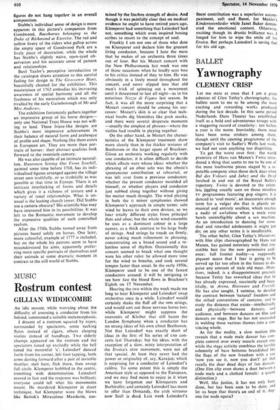MUSIC Rostrum contest
GILLIAN WIDDICOMBE
An idle snooze, while worrying about the difficulty of assessing a conductor from his behind, summoned a suitable metamorphosis,
I dreamt of a rostrum squared by ropes, surrounded by spectators, some sucking flutes instead of cigars, others clasping violins instead of handbags. Two elderly champs appeared on the rostrum and the spectators tuned up excitedly while the bell toned the mournful 'A'. Leinsdorf danced forth from his corner, left foot tapping, both arms darting forward after a pair of invisible shuttles: stab here, flick there, then sweep full circle. Klemperer hobbled to the centre, trembling with determination. Leinsdorf moved in fast and the response was brilliant; everyone could tell what his movements meant. He murdered Klemperer in sheer technique, but Klemperer wore the blows like Bartok's Miraculous Mandarin, sus- tained by the fearless strength of desire. And though it was painfully clear that on medical
evidence he ought to have retired years ago, Klemperer had something that Leinsdorf had not, something which even inspired boxing scribes to resort to the concept of soul.
Frankly I am not one of those who dote on Klemperer and declare him the greatest
living conductor, because I hate the mess
that he makes of an orchestra three times out of four. But his Mozart concert with
the New Philharmonia last week was one of those occasions when he loudly says boo to his critics instead of they to him. He was obviously in a lively mood throughout the concert, and never slipped into that old man's trick of spinning out a movement until it threatened to last all night—as in his notorious Nozze di Figaro last season. In fact, it was all the more surprising that a Mozart concert should be among his suc- cesses: Mozart's skin is so clear that tech- nical boobs dig blemishes like pock marks, and there were several desperate moments —usually the simplest of phrases—where the violins had trouble in playing together.
On the other hand, in Mozart the charac- teristics of the Klemperer treatment show more clearly than in the thicker textures of Beethoven or the larger spans of Bruckner. Given an orchestra working regularly with one conductor, it is often difficult to decide which effects were whose ideas: whether the phrasing of an oboe solo was the oboist's spontaneous contribution at rehearsal, or was left over from a previous conductor; whether the present conductor moulded all himself, or whether players and conductor just rubbed along together without giving the matter much thought. The wind playing in both the G minor symphonies showed Klemperer's approach in simple terms: solo wind he leaves to their own devices, so we hear totally different styles from principal flute and oboe; but the whole wind ensemble he uses as a dominant colour in a large canvas, as a thick contrast to his large body of strings. And strings he treads on firmly, never asking much refinement in phrasing, concentrating on a broad sound and a re- lentless sense of rhythm. Occasionally this concert seemed to break what one thought were his other rules: he allowed more time for the wind to breathe, and took several tempos faster than usual. In the early 1950s, Klemperer used to be one of the fastest conductors around: it will be intriguing to see how fast the blood flows in Bruckner's Eighth on 17 November.
Hearing the two within the week made me long to hear Klemperer and Leinsdorf swap
orchestras once in a while. Leinsdorf would certainly shake the fluff off the NPO strings,
and would sort out those nervous horns too; while Klemperer might suppress the souvenirs of Kleiber that still haunt the London Symphony when a conductor has no strong ideas of his own about Beethoven. Not that Leinsdorf was exactly short of ideas in the first of his series of Lso con- certs last Thursday; but his ideas, with the exception of a slow, misty interpretation of the Eroica's slow movement, were not all that special. At least they never had the power or originality of, say, Karajan; which is surprising for a conductor of Leinsdorf's calibre. To some extent this is simply the American style as opposed to the European, and we may find more to enjoy in it when we have forgotten our Klemperers and Barbirollis; and certainly Leinsdorf has more to offer than Ormandy, the arch virtuoso now SzeII is dead. Last week Leinsdorf's
finest contribution was a superlative accom- paniment, soft and fluent, for Mahler's Kinder/0M's&der while Janet Baker domin. ated the emotional content. Otherwise, exciting though its drastic brilliance was, I longed for him to wipe the smile off his Eroica. But perhaps Leinsdorf is saving that for his old age.








































 Previous page
Previous page